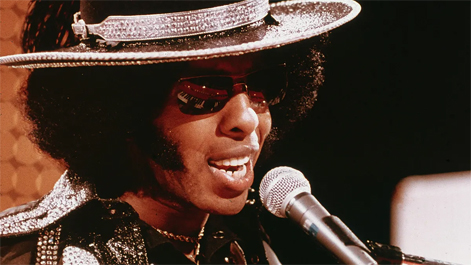|
|
|
|
|
|
 |
|
|
|
| |
Sly
Stone,
Trailblazing
Architect
of Funk,
Dies at
82
Simon
Weinstein
- Media
Matters/Entertainment
Tell Us
USA News
Network
LOS
ANGELES
- Sly
Stone,
the
visionary
force
behind
Sly and
the
Family
Stone
whose
genre-blending
sound
and
boundary-breaking
band
reshaped
American
music in
the late
1960s
and
’70s,
died
Monday
in Los
Angeles
at the
age of
82. Born
Sylvester
Stewart,
Stone
had long
battled
chronic
obstructive
pulmonary
disease
and
other
health
complications.
He
passed
peacefully,
surrounded
by loved
ones,
according
to his
publicist.
A
Revolutionary
Voice in
Sound
and
Spirit
Emerging
from the
Bay Area
in 1966,
Sly and
the
Family
Stone
shattered
conventions
as the
first
major
American
band to
feature
a
racially
and
gender-integrated
lineup.
Their
music
was a
kaleidoscope
of jazz,
psychedelic
rock,
soul,
doo-wop,
and the
nascent
rhythms
of
funk—an
electrifying
fusion
that
yielded
timeless
anthems
like
“Everyday
People,”
“Stand!”
and
“Family
Affair.”
At the
height
of their
influence
from
1968 to
1971,
the band
captured
the
exuberance
and
turbulence
of a
generation.
Their
legendary
1969
Woodstock
performance,
with Sly
clad in
leather
jumpsuits
and
goggle
shades
beneath
a
towering
Afro,
became
emblematic
of an
era.
Songs
like “I
Want To
Take You
Higher”
and
“Dance
to the
Music”
weren’t
just
hits—they
were
calls to
unity,
individuality,
and joy.
A Legacy
That
Echoes
Across
Generations
Sly and
the
Family
Stone’s
sonic
innovations
left an
indelible
mark on
music.
Their
bold
arrangements
and
infectious
grooves
influenced
everyone
from the
Jackson
Five and
the
Temptations
to jazz
titans
Miles
Davis
and
Herbie
Hancock.
Funk
pioneers
like
George
Clinton,
genre-bending
icons
like
Prince
and Rick
James,
and
modern
acts
like the
Black
Eyed
Peas all
drew
inspiration
from
Stone’s
trailblazing
sound.
His
legacy
also
pulses
through
hip-hop,
with
artists
such as
the
Beastie
Boys,
Dr. Dre,
and
Snoop
Dogg
sampling
his
riffs. A
2005
tribute
album
featured
performances
by
Maroon
5, John
Legend,
and the
Roots,
underscoring
the
enduring
relevance
of his
music.
|
|
|
|
|
|
|
|
|